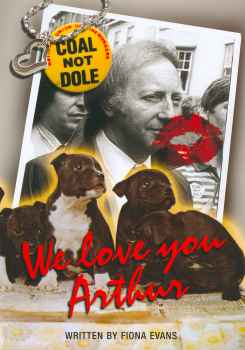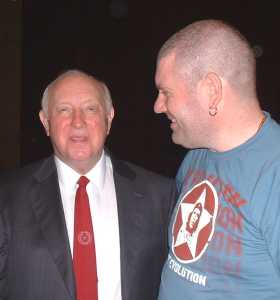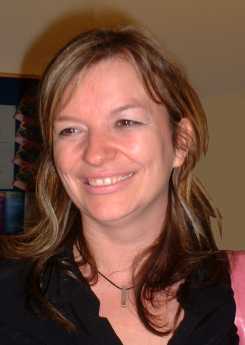
Before George Michael was gay, before Madonna was British, before Bob Geldof fed the world, two teenage girls fell in love with Arthur Scargill.
We Love You Arthur tells the story of Julie and Lisa, two girls coming of age in a community being torn apart. Growing up is never easy, especially in Easington Colliery during 1984. Achieving "big hair" can be a problem, but how can you ever look like Cyndi Lauper when your dad's out on strike and you can't afford food, never mind a can of extra-hold, perm-welding Elnett? And will you ever fit in when the poster-boy you adore is neither Simon le Bon nor Adam Ant, but a middle-aged ginger bloke with a comb-over?
This is the premise of Fiona Evans' play, which ended its tour at the Gala Theatre. We Love You Arthur is a reminder of a time twenty years ago which refuses to lie down and become history; whether because the political wounds inflicted by the 1984 Miners' Strike are still raw, or because Madonna's Like a Virgin is such a great pop record. But it is also a sympathetic portrait of teenage emotions, and a comedy with moments of pure farce - one of the best of which continues the musical theme, as Lisa and Julie attempt to breed a litter of puppies, encouraging the dogs in their illicit encounter with a recording of Je t'aime, moi non plus.

At the center of the play are the two girls. On the surface, the cliché that when two girls are friends, there will be one pretty one, and one who wears glasses, seems to apply here: Lisa (sparkily played by Joanne Hickson) is listed in the published text as "pretty", and it is her family network which holds the stage. But Ashlea Sanderson's portrait of Julie ("Lisa's best mate") has great warmth, making her less of a shadow and more of a companion to her friend and ringleader. Their devotion to their unlikely pin-up had a piquant twist on Sunday evening, as the great man himself was in the audience, and later joined the cast in the bar, signing copies of the text: "I love you too" and enabling one of the young actresses to boast that by the end of the run she really had snogged Arthur Scargill! But it also functioned as an effective plot device, at once endorsing and distancing the play's partisan view of the strike. When that very partisanship comes between the girls, it is made all the more shocking - and all the more plausible - by what has gone before.
The other characters are neither more nor less conventional, but they are given less chance to come to life. The only man in the play, Ray is a cipher, striking miner, unfaithful husband, doting father, driven more by the requirements of the plot than by any inner life of his own: John Carter (from Spennymoor, the only member of the cast from County Durham) does all that is asked of him, but is not given much to work with. Zoe Lambert plays his wife Ann, as well as her mother, the grandmother whose continuing enjoyment of life is expressed through watching Casablanca several times a week. Like so many women of the coalfields, Ann discovers new friendships and new abilities through the strike. Throughout the play she rehearses the first few lines of a speech she has been asked to make at a rally, and it is a sign of the success with which the character is written and played that the audience believe in her enough to want to hear the rest of her speech.

After the performance, author Fiona Evans joined the cast and some of the audience in discussion. It was a rare and illuminating opportunity to learn about the genesis of the play they had just watched, a suitable "extra" for a piece of theatre enjoyed within the framework of a Literature Festival. From a five-minute scene written as a piece of coursework, We Love You Arthur had grown into a play for radio, and then, with the help of New Writing North, developed for the stage and taken to the Edinburgh Festival Fringe.
Traces of the play's origins as a radio piece remain in the use of short scenes interspersed with music, and this is an aspect of the play which is still under evaluation. The music adds greatly to the sense of period, and offers many pleasures of its own (not to mention a sly joke for those who recognise that the a capella recording of When You're Young and in Love is by the Flying Pickets). But it slows the action, and prevents the drama from flowing as smoothly as it might.
The discussion also revealed how much the play owed to real experiences of the Miners' Strike, as perceived by a generation who were children or adolescents in 1984. Fiona Evans' interest in the period had been aroused after a friend had told her of experiences like those of Julie in the play, and she had supplemented this by talking to people in the pit villages, some of whom had told her that it was the best year and the worst year of their lives. As John Carter remarked, those days are not forgotten; "if people don't talk much about it, it's because it was such a bitter defeat." The play may be short on political analysis, but it shows a genuine awareness of the emotional effect on individuals and communities; it is a far cry from Billy Elliot, with its slick use of the miners' lives as exotic local colour!
 |
 |
| Previous report: Dun Elm City |
Next Report: Kitty Fitzgerald, Joolz Denby & Cathi Unsworth |

